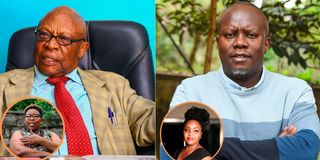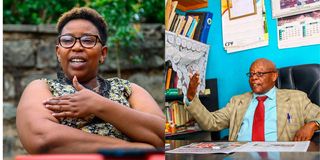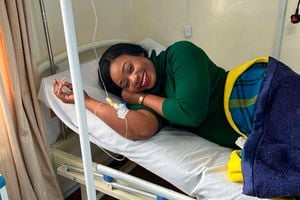
From left: John Baptiste Irungu, inset: Grace Nduta, Con Omore Osendo, inset: Evalyn Allela.
The expression “bosom buddy” takes an entirely new meaning when breast cancer stalks a woman with a partner.
With cancer, that very bosom that probably drew the man to her comes under attack from within. It may start with a lump, and may end with the loss of one or both breasts.
With a key part of femininity under threat, do the two people in a relationship remain bosom buddies? Sometimes the man flees, as Nation Lifestyle learnt when we spoke to breast cancer patients and psychologists. Various studies also show men are more likely to leave a partner with cancer than the other way around. That men tend to view a partner getting sick in almost a mechanical way: they see it as a problem to be solved, but cancer is a lifelong journey.
However, most men stay put, supporting their partners through the shock of diagnosis, the vagaries of treatment and the nightmare of societal stigma.
In line with Breast Cancer Awareness Month, we spoke with two men who were confronted with the news of a cancer diagnosis when their marriages were just getting started. They stayed and became the emotional pillars that their wives could hold onto.

From left: Evalyn Allela, a pharmacist and a breast cancer survivor with her husband Con Omore Osendo, a governance specialist.
Con Omore Osendo, 45: If my wife losing breasts will eliminate cancer threat, so be it?
“When the news came, I looked at her and thought, ‘This is a disease that could kill. Why should I kill you early in your heart and your soul by walking away? And how will I even live with myself that I was just here to love you because you were well, you were working, you had all your faculties put together, and then when the cancer came, I checked out?’ I don’t think that is love in the way I understand it,” says Con.
A governance specialist, Con had just moved in with his wife, Evalyn Allela, when breast cancer struck.
He remembers that they moved in together in early 2020, just weeks before Covid-19. This was to be the start of his second marriage, and Evalyn’s first. He had a daughter and she had a son, and so a blended family was in the making.
A lump that Evalyn had noticed on her breast, accidentally while taking a shower, was not going away and she went to the hospital around May that year.
“It’s when we got the report of a cancerous growth. It was called triple-negative breast cancer (an aggressive type of breast cancer),” says Con.
Fortunately, the cancer had not yet advanced. It was in stage two.
“So, you can imagine, you’ve just moved in together and then this news comes,” he says. “For somebody else, they’ll be like, ‘Ah, this fairy-tale cannot go this way, so, let me duck.’”
“But we faced it head-on, and she had to start her treatment regime then.”
The treatment included surgery to remove the affected part of the breast. [The breast was not cut off completely]. Then chemotherapy and radiotherapy followed, and treatment spanned between 2020 and 2021.
Con made it a point to accompany his wife to the hospital every visit. He wanted to understand the disease and the treatment procedures. At some point, he made the Aga Khan University Hospital his second home.
“For every round of chemo, I was there. I took my work to the hospital,” he says. “When she was doing her chemo…I used to go sit at Java [Coffee House] at Aga Khan, with my laptop and work from there.”
At home, Con chose to hold his wife’s hand as she walked the journey.
“There was the home side of things, and you know what chemo can do... I think we even have a video we took when the hair began falling off. I was with her in front of the mirror and she was just combing it, and the hair would come out with the comb. She had beautiful hair, so that loss was heavy. But she didn’t lose weight. In fact, she added weight,” he recalls.
Evalyn, a pharmacist, was working at the time of diagnosis and would take time off when she needed to go to the hospital for chemo or radiotherapy. However, she could not sustain the demands of the job and she quit.
“She left that job eventually, and I think it was good because we just adjusted a little bit, and I think it helped that she was now at home to go on with the treatment and be able to rest without any challenge,” says Con.
She stayed at home for months before she took up another job at L’Oreal, where she works today as the Head of Medical.
There was a reprieve in mid-2021 when tests showed that the treatment had worked. In December 2021, there was a happy interlude when Evalyn’s dowry payment ceremony was held.
“Going there [at her home] as a blended family was quite interesting,” says Con.
It has been three years since she finished her treatment.
“We are in year three. So, we are not entirely relaxed,” he says, adding that Evalyn attends regular checks, as they wait for five years before they can celebrate a triumph over cancer.
The risk of cancer recurrence is lower if both breasts are removed, doctors have told the couple, but it is not zero percent.
If they were to choose double mastectomy [removal of both breasts], there is an option of getting breast reconstruction with implants or tissue from another body part but they have sworn never to consider implants.
“Silicone has its complications, which is not an option for us,” says Con.
For some men, the cancer they can deal with, but losing the breast strains intimacy.
“If it [loss of breast] ensures no cancer checks in, I’m ready. I know for men, that’s an important part. But if it’s going to further enhance her health and ensure that this thing doesn’t recur, then I’d reconcile with it,” says Con.
So often a husband's brevity and care through his spouse's breast cancer diagnosis and treatment is overlooked or forgotten, but Con's is felt by everyone in the room.
If there is one thing he has no regrets about is staying.
“We are good friends. You know, in a relationship, you can be partners but you’re not friends. We’ve become very good friends. I’m enjoying the relationship and I look forward to the future and growing old together,” says Con.
Evalyn is today a cancer advocate, using social media and physical gatherings to educate the masses about the disease and also mobilising resources for those who may face financial challenges in their quest for cancer treatment.

From left: Grace Nduta and John Baptiste Irungu are both directors of the Ruiru Star Academy.
John Baptiste Irungu, 78: She has only one breast but that’s no problem for me
Asked why he decided to stay with his wife despite a cancer diagnosis, he replies: “[A thought] just came to me: it’s God trying me. It’s a trial that I’m going through, and maybe God wants to know whether I will take her as my wife, even though now she was diagnosed with breast cancer. And I made my decision. I said, ‘I’ll walk with her and do whatever is necessary.’”
John Baptiste, better known as JB, is the director of the Ruiru Star Academy. The retired accountant had chosen Grace Nduta to be his partner after his first wife died in 2018.
In February 2019, Grace was found to have stage 3b breast cancer when she was two weeks pregnant. They had not been married formally, so JB had a chance to show a clean pair of heels. He was conflicted.
“It was not easy. I even had to consult a friend: ‘Now that she’ll be down with cancer, what do you think about that?’ My friend didn’t have an answer on whether to take her or not, but personally, I made the bold decision to take her as my wife,” he says.
After the cancer diagnosis, the couple was advised to terminate the pregnancy, but they chose to keep the baby. By the time she was delivering at 32 weeks through Caesarean section, one of her breasts had been removed to get rid of the 7.6-centimetre lump, plus any cancerous cells. She had to breastfeed with one breast.
“The boy came out very strong. The mother also survived and life continued,” says JB.
Grace, who is his co-director at the school and also the administrator, continues to take her cancer medication. They had their wedding in August this year, and their son is now five years old.
JB is in awe of Grace’s bravery in the face of cancer.
“She’s a very strong lady,” he says. “In fact, many ladies with a similar problem keep consulting her a lot. Sometimes she goes to the Kenyatta National Hospital and when she is seated, waiting to be attended to, even nurses tell her, ‘Stand up, leave the seat for the sick.’ Only for her to say, ‘But I’m also waiting to see the doctor.’”
Having accompanied his wife to several doctors' appointments, JB wants doctors to stop discussing cancer with patients as if it is a death sentence.
“They talk to those patients like they have already signed the death sentence, which is very wrong,” says JB, who is also a cancer survivor.
JB was diagnosed with lung cancer in 1989, was treated and says the right attitude is key to tackling the disease.
“I’ve told my wife, I had the disease too, 35 years ago, and I went through it. If you have faith and confidence [in God], you can live as long as anybody else. People should stop seeing cancer like it’s a death sentence; it is not,” says JB.
To any man whose wife has cancer, JB has one plea: “Please love her.”
“You know, love is the key thing,” he says.
“I normally tell my wife: ‘You are healed already. The way I’m seeing you; you’re okay. You are healed.’ One other thing where I think people go wrong is that when they hear that a woman doesn’t have one breast, they associate it with witchcraft. For me, I have no problem that she doesn’t have one breast. I’m happy with her, and we are running our business without any hitches,” he says.
He knows too well being an emotional pillar to a spouse with cancer is a life-long journey.
“Grace is in many cancer support groups. She helps very many cancer warriors. They have become friends, and she even goes to visit them. But when she loses a friend, it’s very traumatising. I tell her ‘Don’t worry, it was their time to go,” he says.
A cancer counsellor’s views
For more than 20 years, Philip Odiyo has been in the field of psycho-oncology, giving psychological support to cancer patients and their caregivers and families of cancer warriors.
We ask him: what is the worst thing a spouse can do to a partner who has been found to have cancer?
“Abandonment,” he says. “I’ve come across many survivors who have been left by their spouses.”
Desertion is a big blow to a new cancer patient because of the way humans respond to the news, Mr Odiyo notes. With a cancer diagnosis, he observes, a person finds him or herself in an existential threat.
“It brings you face-to-face with the possibility of death because when you’re diagnosed, depending on the stage of the disease, you can get well or the disease can deteriorate depending on what kind of cancer and the stage,” he says.
“Cancer doesn’t announce that it’s coming. It finds you unprepared emotionally, maybe even financially, and of course also sometimes psychologically. It’s not something that you see coming. So there’s a shock, there’s disillusionment, there’s a possibility of dying, and maybe you have projects that you have not done. So, at that moment, you are at your most vulnerable. So, the worst thing you can do to someone [who has been found to have cancer] is to leave them,” he says.
A study conducted in 2000 recommended that clinicians should discuss the quality of the relationship a newly diagnosed breast cancer patient has with their spouse. The level of their bond, said the study published in the US National Library of Medicine “may be a main predictor of post-diagnosis marital adjustment”.
Mr Odiyo agrees with that recommendation, noting that a cancer diagnosis can make a relationship better or worse.
“It depends on the quality of your relationship before the cancer,” he tells Nation Lifestyle.
Some will feel compassionate and form a tighter bond, he says, and some will flee.
Breast cancer may also lead to mastectomy [cutting off of one or both breasts], and this might alter the relationship.
Mr Odiyo says: “For the woman, the breast is the epitome of femininity. So, when that breast is not there, she might feel like ‘this is not me’. Maybe she’s lost one breast or both breasts, so she looks like a man. So, self-acceptance is a key thing for the woman before we even talk about the man and their sexual life. So, she will not feel as sexually attractive to the man the way she used to be because of the loss of that feminine part of their body.”
He notes that a couple’s sex life is further impacted by cancer medication.
“Most of the treatment for breast cancer [involves] manipulation of hormonal levels. That will affect their sexual life. That’s where now the challenge comes in. If the man is not patient enough, of course they are also emotionally drained, taking care of patients when they are sexually not satisfied,” he says.
The solution to this, he says, is for couples to discuss matters openly.
“That’s why it’s important for us that when we do therapy, we involve both of them,” says Mr Odiyo.








